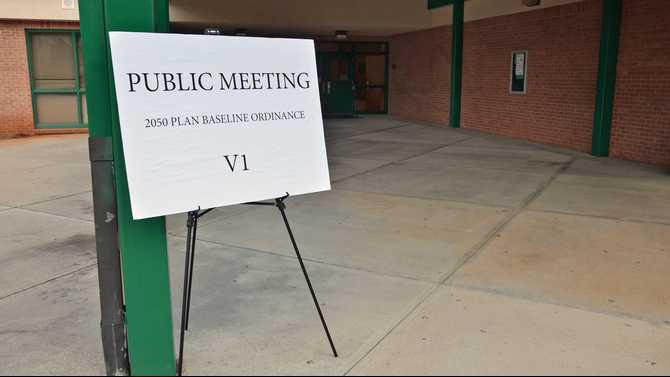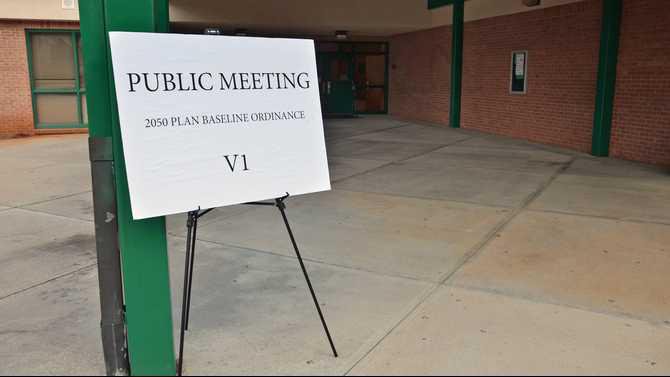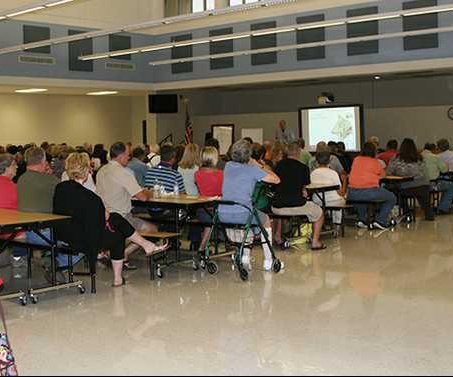Elected officials were able to hear directly from their constituents thanks to a new format tried Tuesday at the fourth of five public hearings on the 2050 Plan. What they heard wasn’t necessarily new, but the small-group discussions were well worth it, county commissioners agreed Wednesday.
“I thought it was great,” Commissioner John Douglas said. “The interaction between the citizens and the commissioners was exactly what we needed. I hope we continue to do that. As we continue to work through the 2050 Plan I’d like to use that format.”
The public hearing began with a 10-minute introduction by Chamber of Commerce President Hunter Hall, after which attendees were offered three choices — stay in the auditorium at Eastside High School to hear a presentation about the basics of the plan from Hall, head to the cafeteria for small-group discussions with elected officials, or stand in the atrium with planners and offer “solutions” to various problems with the plan.
Many of the 200 or so people attending Tuesday’s meeting stayed with Hall. The original purpose of having five hearings spread throughout the county was to reach as many people as possible, Hall said, and many of the people Tuesday were at their first meeting.
Dozens followed the elected officials to the cafeteria. Only a handful stayed with planners to work on solutions.
“We’ve rehashed it so much there’s not a whole lot new out there, but it was great to hear everybody’s ideas and keep the people involved in what we’re doing in the community,” Douglas said. “I thought it was well worth the time we put into it last night.”
Commissioner Nancy Schulz agreed: “Personally, I really liked (Tuesday) night’s format because it gave me a chance to hear very specific questions from, specifically, the areas in my district. I don’t have any of the large conservation districts (home of the controversial 20-acre lot minimums); I have the rural district and the compact community zones. It allowed me to hear questions unique to those areas.
“I was very appreciative of the people who came and sat and helped me, to educate me about their position, and I feel very comfortable that in time we’re going to get a plan that is really something that our county can be proud of because they helped create it.”
She particularly liked a suggestion delivered to the commissioners suggesting the “transferrable development rights” portion of the plan be converted into more of an incentive program to help conserve rural areas of the county.
“I read it and thought ‘Holy moly, this is what we’ve been looking for.’ He gave suggestions for an incentivized TDR plan. The more acreage you’ve got, the exponentially more TDR credits you’ve got. I don’t know if it would work … but it’s a great idea,” she said. “This is exactly what we’re looking for – ideas to take those four principles and figure out at the end of the day how to achieve (them). At the end of the day, that is what we really want.”
The plan was created with four goals, or principles, in mind: preserving the county’s drinking water, particularly the Alcovy River; developing communities; connecting areas of the county; and coordinating governmental spending.
The county’s current zoning “allows for sprawl,” Schulz said. “The status quo is not going to work. But keeping in mind those four principles, how do we go to something that achieves those four principles with something the community has created? I would say I was very energized by last night.”
Commission Chairman Keith Ellis said the format change “was well received. Our citizens were happy that they could speak to directly to their elected official concerning the 2050 Plan. They took the opportunity to ask me questions and I was able to get their views and opinions during that time as well.”
During the meeting, Douglas, Ellis, Schulz and mayors Jerry Roseberry of Oxford, Arline Chapman of Porterdale and Ronnie Johnston of Covington sat (for a while, at least) at separate tables and fielded questions. Quickly, however, Johnston and Chapman were at Ellis’ table, where they could participate in the conversation.
Ellis told participants he’s “not about to OK” the plan as-is. He said his goal is to pass a plan and the ordinances to enforce it that will “stand the test of time” and be something his grandchildren can be proud of.
Opponents unite
Outside Eastside, opponents of the plan set up a table and collected signatures and email addresses for a clearing house of information about the plan, said Fred Wheeler. The group has a facebook page; search for “Stop the 2050 Plan.”




